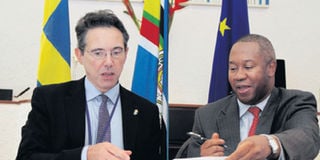Sweden deal to help EAC capital markets

Swedish ambassador to Kenya Johan Borgstam (left) with IFC regional director for Eastern and Southern Africa Oumar Seydi Monday at the signing of agreements on cooperation with Sweden, the East African Community, IFC and the World Bank. The programmes aim at boosting financial sector development and regionalisation. PHOTO/DIANA NGILA
What you need to know:
- The regional block suffered its latest unity challenge last week after member states failed to agree on the East African Monetary Union Protocol that was expected to be signed by the Heads of States at the end of this month.
The East African Community and the government of Sweden Monday signed an agreement to promote the creation of a regional capital market.
The initiative is aimed at increasing liquidity and market participation by investors across borders.
The bond market development programme will specifically contribute to improving bond issuance by streamlining requirements and regulations and building a regulatory capacity.
It will be implemented by the World Bank and IFC and will allow owners of large real estate and infrastructure projects to raise funds through issuance of bonds across the region’s markets.
“IFC is committed to promoting the development of local currency capital markets in East Africa. Our new programme, in partnership with Sweden and the East African Community, will allow us to work together with World Bank colleagues to build the foundation for housing and infrastructure projects requiring long term capital to raise local funds in their own markets,” said Mr Oumar Seydi, IFC director for Eastern and Southern Africa.
The programme also seeks to develop a government bond market strategy that will act as a roadmap to benchmark development of the regional market and build investor confidence that is necessary to increase the number of bond issues.
The move comes at a time when cracks are emerging within the EAC, with Burundi and Tanzania excluded from crucial infrastructure summits by other partner states.
The regional block suffered its latest unity challenge last week after member states failed to agree on the East African Monetary Union Protocol that was expected to be signed by the Heads of States at the end of this month.
These differences are bound to influence the manner in which implementation of the Efficient Securities Markets Institutional Development programme for the East African Community will take place.
Speaking at the event where the agreement was signed, EAC’s deputy secretary general Enos Bukuku said the programme would benefit the region’s financial institutions and capital market regulators.
“It will further support EAC partner states to develop a single regional market in financial services. It will benefit the EAC Secretariat, capital market regulators, central banks and other players in the EAC capital markets.” said Mr Bukuku.




